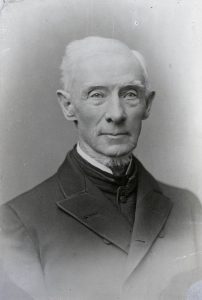(Jan. 6, 1810-Mar. 24, 1890). Born in New Lanark, Scotland, Richard Owen was the youngest child of utopian theorist Robert Owen. In 1828, he arrived at the socialist community recently launched by his father at New Harmony, Indiana. There, he taught school and engaged in scientific farming.
Drawn to the military life, Owen left New Harmony in April 1847 to fight in the Mexican War, after which he became a professor of natural science at the Western Military Institute in Nashville, Tennessee. As the threat of secession intensified in the late 1850s, however, Owen found himself increasingly uncomfortable in his southern surroundings and returned to Indiana to assist his brother, David Dale Owen, in his work as state geologist.
When the erupted in 1861, Owen received a commission as colonel of the 60th Indiana Volunteers. In February 1862, Governor selected him to be commandant of in Indianapolis, one of the North’s major prisoner of war installations.
Owen’s service elicited praise from both federal officials and his Confederate prisoners. He established disciplinary measures that were firm yet humane, which allowed for virtual self-government among the 3,700 prisoners. His benevolence led to several reforms, including building a camp bakery to give prisoners work and to generate funds for their care. Reassigned in May 1862, Owen later fought in the Vicksburg campaign.
In 1864, Owen relinquished his commission and joined the science faculty at Indiana University, where he would teach and write for the next 15 years. He served briefly as the first president of Purdue University in 1873. Twenty years after Owen’s death, former prisoners of Camp Morton erected a bronze bust of the colonel in the Indiana Statehouse in appreciation for his courtesies as their commandant.

Help improve this entry
Contribute information, offer corrections, suggest images.
You can also recommend new entries related to this topic.





